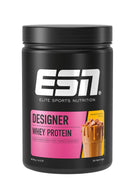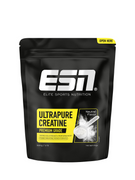Jod und Selen – die beiden wichtigen Spurenelemente für deine Schilddrüse
Zu den häufigsten Ursachen für eine Schilddrüsenunterfunktion zählen die Autoimmunerkrankung Hashimoto, eine Schilddrüsenentzündung und der Jodmangel. Zur Behandlung von Schilddrüsenerkrankungen sollte grundsätzlich ein Arzt aufgesucht und eine entsprechende Behandlung sichergestellt werden.
Mit unserem Kelp Iodine sagen wir dem Mangel an Jod – als eine der häufigsten Ursachen – den Kampf an und unterstützen somit nicht nur die gesunde Funktionalität deiner Schilddrüse, sondern bieten deinem Körper auch weitere Vorteile durch die nachweisbare Wirkung von Jod. Jod wird zur Bildung der Schilddrüsenhormone T4 und T3 benötigt. Es steuert die Aktivierung von T4 in T3. So trägt es maßgeblich zur gesunden Produktion von Schilddrüsenhormonen und einer normalen Schilddrüsenfunktion bei. Das BfR hat Anfang 2021 erst wieder davor gewarnt, dass die Jodzufuhr in der deutschen Bevölkerung weiter zurückgeht. Unter dem Aspekt, dass chronischer Jodmangel eine Schilddrüsenvergrößerung verursachen kann, von der mehr als ein Drittel der Bevölkerung betroffen ist, ist das besonders bedenklich. Des Weiteren unterstützt Jod deinen Energiestoffwechsel. Es kann also sein, dass deinem Körper Jod fehlt, wenn du dich häufig energielos fühlst, obwohl du ausreichend schläfst und isst. Ein weiterer Vorteil bietet sich bei deinen kognitiven Funktionen – solltest du dich nicht gut konzentrieren können oder Probleme beim Lernen bzw. Denken haben, kann ein Jodmangel der ausschlaggebende Grund dafür sein. Neben der Unterstützung einer gesunden Funktion deines Nervensystems, spielt Jod auch eine wichtige Rolle bei der Erhaltung gesunder Haut. Solltest du Probleme mit trockener oder schuppiger Haut haben, kann dies ebenfalls ein Anzeichen für eine zu geringe Jodzufuhr sein.
Doch nicht nur Jod, sondern auch die Kombination mit Selen soll die gesunde Schilddrüsenfunktion unterstützen können. Jod spielt bei der Produktion der Schilddrüsenhormone T3 und T4 eine Schlüsselrolle und steuert zusätzlich die Aktivierung von T4 in T3. Damit deine Schilddrüse gesund funktionieren kann, benötigt sie jedoch auch Selen als Bestandteil des Enzyms Thyroxin-5-Dejodase, damit die Hormone aktiviert werden und das inaktive T4 in aktives T3 umgewandelt werden kann. Doch auch dein Immunsystem wird dir danken, wenn du Selen über ein Nahrungsergänzungsmittel zuführst. Wenn du dich häufig erkältest und dadurch niedergeschlagen und energielos bist, kann es sein, dass dein Körper nicht ausreichend mit Selen versorgt ist. Selen trägt außerdem zur Erhaltung normaler Haare und Nägel bei. Wenn du also keine gesund aussehenden Haare und Nägel hast und dein Bedarf an Zink gedeckt ist, ist es nicht unwahrscheinlich, dass deinem Körper Selen fehlt. Für eine zusätzliche Versorgung mit Selen empfehlen wir dir daher unser Q10 Pro + Selen.
Sollte dein Bedarf an Zink jedoch auch nicht gedeckt sein, kann dir unser ESN Zink dabei helfen, deinen täglichen Bedarf an Zink zu decken
Aktuelle Versorgungssituation mit Jod und Selen in Deutschland
Da die Böden in Deutschland sehr Jod- und Selen-arm sind, zeichnet sich dieser Mangel auch in den pflanzlichen und tierischen Lebensmitteln ab, wodurch du deinen Bedarf beider Spurenelemente über die alltägliche Ernährung nicht ausreichend decken kannst.
Die Zahlen zur Jodversorgung sind erschreckend: Laut der Nationalen Verzehrsstudie II (NVS II) des Max Rubner-Instituts (MRI) erreichen 97 % der Frauen und 96 % der Männer die Referenzwerte für eine ausreichende Zufuhr nicht.[1] Im Jahr 2015 bestätigte das Robert-Koch-Institut (RKI) die Zahlen im Bericht zur Gesundheit in Deutschland.[2] Zuletzt warnte auch das Bundesamt für Risikobewertung (BfR) vor einer weiter rückläufigen Jodzufuhr mit all ihren gesundheitlich negativen Folgen.[3]

Abbildungen zur Jodzufuhr in der D-A-CH-Region des Max Rubner-Instituts[4]
Das Bundeszentrum für Ernährung (BZfE) hat bereits im Jahr 2017 darauf hingewiesen, dass der Selenmangel in der Bevölkerung zunimmt und ein solcher zu Erkrankungen des Herzmuskels führen kann.[5] Nach aktuellen Schätzungen werden in Deutschland täglich lediglich 40 mcg Selen pro Tag aufgenommen. Dieser Wert liegt deutlich unter der empfohlenen Referenzmenge, über die du im Folgenden mehr erfahren wirst.
Dein Bedarf an Jod und Selen zur optimalen Unterstützung deiner Schilddrüse
Für eine ausreichende – also nicht optimale – Versorgung eines normalaktiven Menschen wurden im Jahr 2008 laut NRV (nutrition reference values) die Bedarfsmengen von 55 mcg Selen und 150 mcg Jod pro Tag festgelegt. Auch die Deutsche Gesellschaft für Ernährung (DGE) setzt ihr Empfehlung mit 60-70 mcg Selen und 200 mcg Jod pro Tag konservativ niedrig an, denn die aktuelle Fachliteratur aus dem Jahr 2020 nennt folgende Referenzwerte: 100 mcg Selen pro Tag für eine ausreichende und 250 mcg Selen pro Tag für eine optimale Zufuhr (Biesalski, 2020).
Solltest du viel Sport machen, ist eine ausreichende Mineralstoffversorgung für dich von besonderer Bedeutung, da dein Bedarf deutlich erhöht ist. Durch Sport gibst du 30-50 mcg Jod pro Liter Schweiß ab und gemäß deiner Aktivität und der Umgebungsbedingungen variiert dein Schweißverlust zwischen 0,5 und 1,7 Liter pro Stunde.[6],[7] Das wiederum entspricht einem Jodverlust von 15 bis 85 mcg pro Stunde.
Quellen
- https://www.mri.bund.de/fileadmin/MRI/Institute/EV/NVSII_Abschlussbericht_Teil_2.pdf
- https://www.rki.de/DE/Content/Gesundheitsmonitoring/Gesundheitsberichterstattung/GBEDownloadsGiD/2015/03_gesundheit_in_deutschland.pdf?__blob=publicationFile
- https://www.bfr.bund.de/cm/343/ruecklaeufige-jodzufuhr-in-der-bevoelkerung-modellszenarien-zur-verbesserung-der-jodaufnahme.pdf
- https://www.mri.bund.de/fileadmin/MRI/Institute/EV/NVSII_Abschlussbericht_Teil_2.pdf
- https://www.bzfe.de/service/news/aktuelle-meldungen/news-archiv/meldungen-2017/maerz/selenmangel-nimmt-zu/
- https://www.ncbi.nlm.nih.gov/pmc/articles/PMC5371639/
- https://pubmed.ncbi.nlm.nih.gov/31230518/









